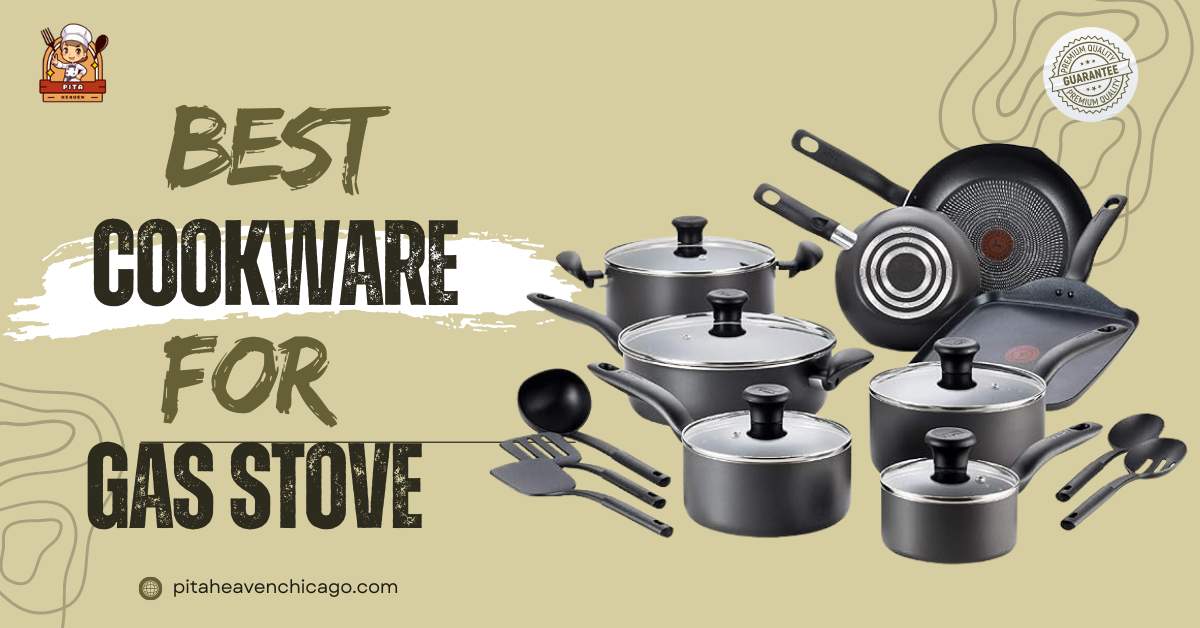The best cookware for gas stoves is stainless steel or cast iron. Both materials offer durability and excellent heat conduction.
Gas stoves require cookware that can handle high temperatures and distribute heat evenly. Stainless steel with an aluminum or copper core is ideal for its durability and heat conduction. Cast iron is another excellent choice, known for its heat retention and even cooking.
These materials ensure consistent cooking results, which is essential for both amateur cooks and professional chefs. Selecting the right cookware enhances cooking efficiency and improves meal quality. Opting for high-quality cookware also means a longer lifespan and better performance on gas stoves. Investing in the right tools can make a significant difference in your cooking experience.
Material Considerations
Choosing the best cookware for gas stoves involves knowing different materials. Each material has unique benefits and drawbacks. Making the ideal decision for your kitchen can be aided by your understanding of these.
Stainless Steel
Stainless steel cookware is very popular. It is durable and resistant to rust. This material is also non-reactive, meaning it does not change food flavors. Cookware made of stainless steel frequently has a copper or aluminum core. This helps with even heat distribution. Below are key points about stainless steel cookware:
- Durable and long-lasting
- Resistant to rust and corrosion
- Non-reactive with food
- Even heat distribution with aluminum/copper core
Cast Iron
Another excellent choice for gas stoves is cast iron cookware. It cooks food evenly and holds heat well. Cast iron can be used on high heat, making it versatile. It does need special care to prevent rust. HCast iron has the following advantages:
- Excellent heat retention
- Even cooking on gas stoves
- Can be used on high heat
- Needs seasoning to prevent rust
Aluminum
Aluminum cookware is lightweight and heats up quickly. This material is often coated with non-stick surfaces. It is great for quick and even cooking. However, aluminum can react with acidic foods, altering their taste. Key points of aluminum cookware include:
- Lightweight and easy to handle
- Heats up quickly and evenly
- Often comes with non-stick coating
- Can react with acidic foods
Copper
Copper cookware is known for excellent heat conductivity. It quickly heats up and cools down. Copper cookware often has a stainless steel lining to make it non-reactive. It needs to be polished frequently to keep its luster. Benefits of copper cookware include:
- Excellent heat conductivity
- Heats up and cools down quickly
- Usually lined with stainless steel
- Requires regular polishing
Heat Conductivity
Choosing the right cookware for gas stoves is crucial for perfect cooking. One key factor is heat conductivity. Good heat conductivity ensures even cooking.
Even Heating
Even heating is essential for delicious meals. High heat conductivity cookware disperses heat uniformly. This guarantees that food cooks evenly and avoids hot spots.
Some materials known for even heating are:
- Copper: Excellent heat conduction
- Aluminum: Lightweight and affordable
- Stainless Steel with Aluminum Core: Combines durability and conductivity
Using cookware that heats evenly helps avoid burning or undercooking.
Temperature Control
Temperature control is vital for precise cooking. Materials with high heat conductivity respond quickly to temperature changes.
Here is a table showing the responsiveness of different materials:
| Material | Responsiveness |
| Copper | Very High |
| Aluminum | High |
| Cast Iron | Low |
Quick temperature adjustments are crucial for delicate dishes. Choose cookware that offers good control over heat.
Durability And Longevity
Choosing the best cookware for gas stoves is essential. Durability and longevity are key factors. Cookware should last many years and maintain its quality. This section will focus on two important aspects: scratch resistance and warping prevention.
Scratch Resistance
Cookware for gas stoves must resist scratches. Scratched surfaces can impact cooking performance. Here are some materials known for their scratch resistance:
- Stainless Steel: Highly resistant to scratches and dents.
- Hard-Anodized Aluminum: Offers a tougher surface than regular aluminum.
- Ceramic: Scratch-resistant and non-toxic.
Using utensils made of wood or silicone helps prevent scratches. Avoid using metal utensils on your cookware. This keeps the surface smooth and scratch-free.
Warping Prevention
Warping can ruin cookware. Gas stoves produce uneven heat. This can cause cheaper materials to warp. Here’s a table showing materials with high resistance to warping:
| Material | Warping Resistance |
| Cast Iron | Excellent |
| Stainless Steel | Good |
| Hard-Anodized Aluminum | Good |
Thicker cookware tends to resist warping better. Look for cookware with a heavy base. This helps distribute heat evenly. Avoid sudden temperature changes. For example, don’t immerse hot pans in cold water.
Compatibility With Gas Stoves
Choosing the best cookware for gas stoves is crucial. The right cookware ensures even cooking and safety. Let’s dive into key factors like flat bottoms and stability on grates.
Flat Bottoms
Flat-bottomed cookware is essential for gas stoves. It provides even heat distribution. This prevents hot spots and uneven cooking. A flat bottom ensures the cookware sits correctly on the burner.
Flat bottoms help save energy. They make sure the flame touches the cookware directly. This results in faster cooking times. Here is a quick comparison:
| Flat Bottom Cookware | Rounded Bottom Cookware |
| Even heat distribution | Uneven heat |
| Stable on the burner | Wobbles on the burner |
| Efficient energy use | Energy waste |
Stability On Grates
Stability on grates is another key factor. Gas stoves have grates that hold the cookware. The cookware should sit firmly on these grates.
Unstable cookware can be dangerous. It can tip and cause spills. Look for cookware with a wide and flat base. This ensures it stays stable on the grates.
Rubber or silicone handles add extra stability. They prevent the cookware from sliding. Choose cookware that fits well with your stove’s grates.This guarantees a secure and enjoyable cooking experience..
Maintenance And Care
Understanding the maintenance and care of your cookware ensures longevity and performance. Proper care keeps your cookware looking new and functioning effectively. Let’s dive into the essential aspects of maintaining your cookware for gas stoves.
Ease Of Cleaning
Cleaning your cookware should be a simple task. Cleaning some materials is simpler than cleaning others. Stainless steel and non-stick pans are usually easy to clean. Cast iron and copper require special attention.
- Stainless steel: Use warm water and mild soap.
- Non-stick: Avoid metal utensils to prevent scratches.
- Cast iron: Rinse with hot water and dry immediately.
- Copper: Use a mixture of salt and vinegar for stains.
Always dry your cookware thoroughly to prevent rust or stains. Dishwasher use depends on the material. Non-stick and cast iron should not go in the dishwasher.
Seasoning And Upkeep
Some cookware, like cast iron, requires seasoning for better performance. The process of seasoning entails heating the pan and adding a thin coating of oil. This creates a natural non-stick surface.
- Preheat your oven to 375°F (190°C).
- Coat the pan with a thin layer of vegetable oil.
- Invert the pan and place it inside the oven.
- Bake for one hour.
- Let it cool in the oven.
Regular seasoning keeps your cast iron in top shape. Refer to the manufacturer’s care directions for other materials. Proper upkeep extends the life of your cookware.
| Cookware Type | Ease of Cleaning | Seasoning Needed |
| Stainless Steel | Easy | No |
| Non-stick | Very Easy | No |
| Cast Iron | Moderate | Yes |
| Copper | Moderate | No |
By following these tips, you can ensure your cookware remains in excellent condition. Proper maintenance and care lead to better cooking results.
Safety Features
It is important to select the proper cookware for gas stoves. Safety features are important to consider. They ensure your cooking experience is safe and pleasant. Let’s explore some key safety aspects.
Heat-resistant Handles
Handles that resist heat are a must for gas stoves. They prevent burns and make cooking safer. Select handles composed of materials such as stainless steel or silicone. These materials can handle high temperatures. They remain cool to the touch.
Some cookware comes with padded grips. These grips provide extra safety and comfort. Here’s a quick comparison of common handle materials:
| Handle Material | Heat Resistance | Comfort |
| Silicone | High | Soft and cool |
| Stainless Steel | Moderate | Sleek and sturdy |
| Plastic | Low | Can melt or warp |
Non-toxic Coatings
Non-toxic coatings are essential for safe cooking. They stop dangerous substances from leaking into your food. Opt for cookware with PFOA-free and PTFE-free coatings. These coatings are safe and eco-friendly.
Some popular non-toxic coatings include:
- Ceramic
- Hard-Anodized Aluminum
- Stainless Steel
Let’s compare these coatings in terms of safety and performance:
| Coating Type | Non-Toxic | Durability |
| Ceramic | Yes | Moderate |
| Hard-Anodized Aluminum | Yes | High |
| Stainless Steel | Yes | High |
Choosing cookware with these safety features ensures a healthier, safer cooking experience. Your food will taste better and be free from harmful chemicals.
Top Cookware Recommendations
Selecting the proper cookware for gas stoves can be difficult. Gas stoves require durable, heat-resistant materials. They should ensure even cooking and withstand high temperatures. In this section, we provide top cookware recommendations. These choices cater to different needs and budgets.
Best Overall
For the best overall cookware, consider stainless steel with an aluminum core. This combination ensures durability and excellent heat distribution. A popular choice is the All-Clad Stainless Steel Cookware Set. It offers:
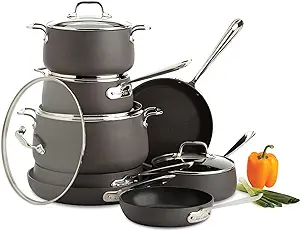
All-Clad Stainless Steel Cookware Set
Another great option is the Cuisinart Multiclad Pro Stainless Steel Set. This set is affordable and reliable. It includes:
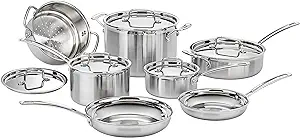
Cuisinart Multiclad Pro Stainless Steel Set
Budget-friendly Options
Not everyone can afford high-end cookware. Budget-friendly options provide excellent performance without breaking the bank. The T-fal E918SC Ultimate Hard Anodized Cookware Set is a top choice. It features:
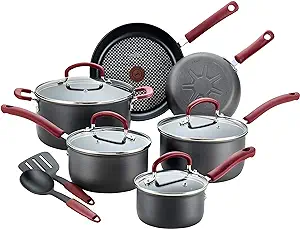
T-fal E918SC Ultimate Hard Anodized Cookware Set
Another great budget option is the AmazonBasics Non-Stick Cookware Set. This set includes:
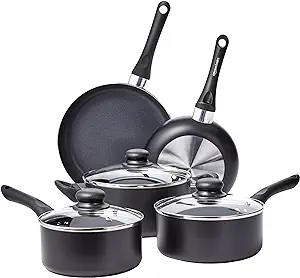
AmazonBasics Non-Stick Cookware Set
Premium Choices
For those seeking the best quality, premium cookware is worth the investment. The Le Creuset Signature Enameled Cast-Iron Cookware Set is a top-tier option. It offers:
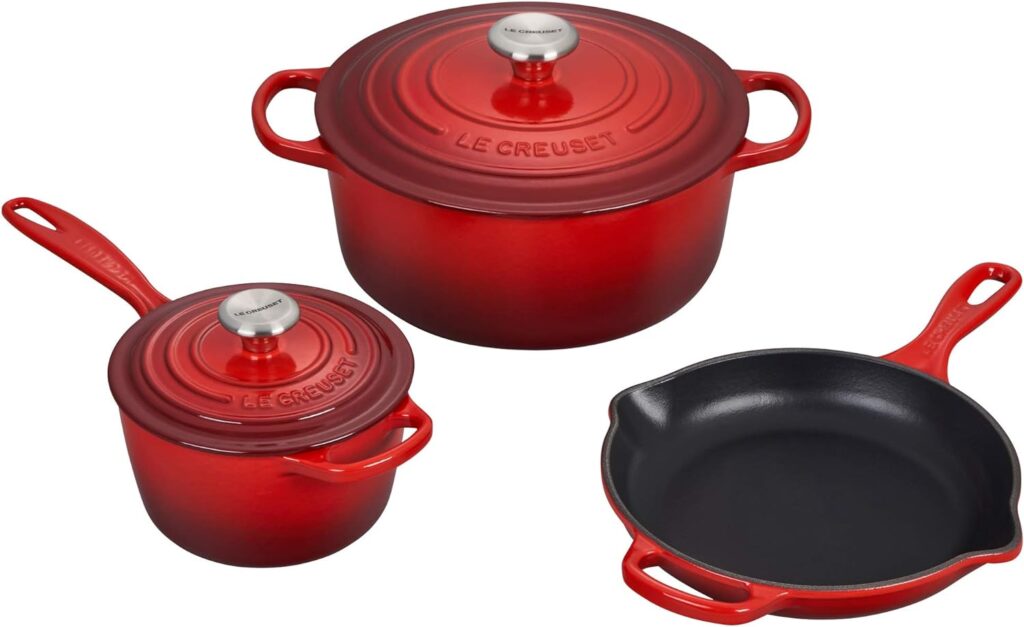
Le Creuset Signature Enameled Cast-Iron Cookware Set
The Demeyere Atlantis Stainless Steel Cookware Set is another premium choice. This set includes:
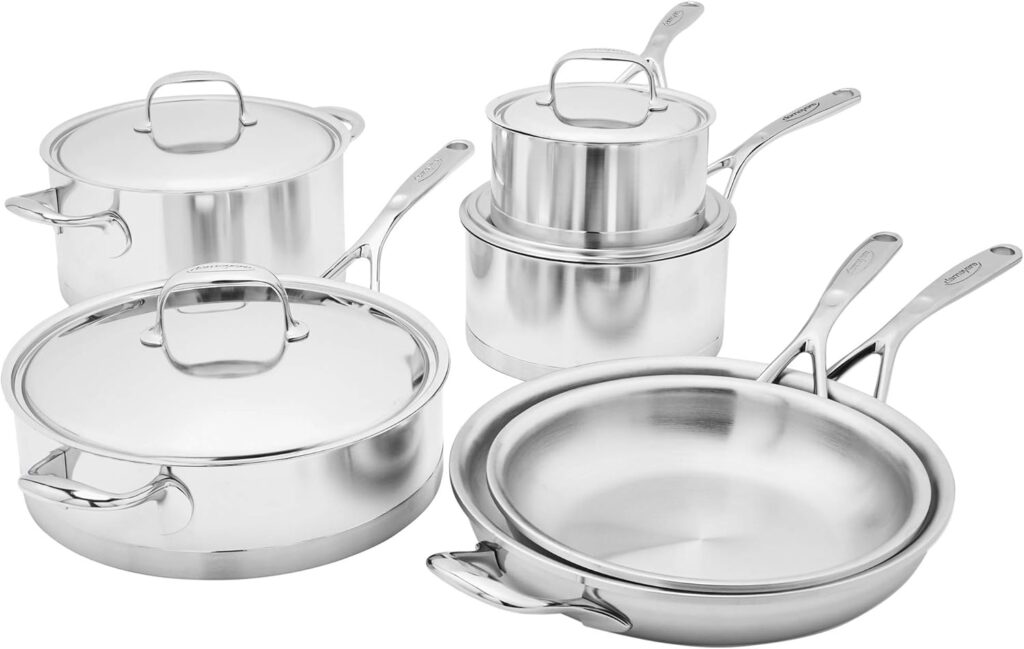
Demeyere Atlantis Stainless Steel Cookware Set
Choosing the right cookware ensures better cooking experiences. Whether you need budget-friendly or premium choices, there’s something for everyone.
FAQ’s
What Type Of Pan Is Best For A Gas Stove?
The best pans for gas stoves are stainless steel, cast iron, and copper. They provide durability and uniform heat distribution.
What Pots Are Best For Gas Stove?
Pots made of copper, cast iron, and stainless steel work well with gas burners. They are robust and uniformly disperse heat.
What Pans Should Not Be Used On A Gas Stove?
Avoid using non-stick, glass, and ceramic pans on a gas stove. They can crack or get damaged easily.
Do You Need Special Cookware For Gas Stoves?
No, you don’t need special cookware for gas stoves. Most cookware types, like stainless steel and cast iron, work well. Just ensure the pots and pans have flat, stable bases for even heat distribution. Quality cookware can enhance cooking performance on gas stoves.
Conclusion
Choosing the best cookware for gas stoves can enhance your cooking experience. Opt for materials like stainless steel, cast iron, or copper for durability and performance. Always consider your cooking needs and budget when making a decision. The right cookware will make your time in the kitchen more enjoyable and efficient.

